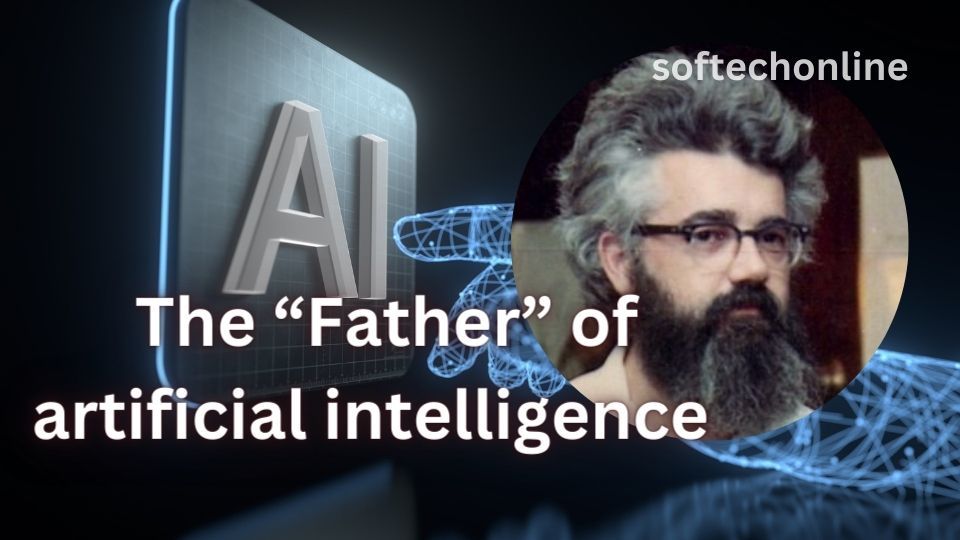The Father of Artificial Intelligence: A Legacy of Innovation.
The quest to create intelligent machines has captivated humanity for centuries. From the mythical creations of Hephaestus in Greek mythology to the fantastical robots depicted in science fiction, the dream of artificial intelligence (AI) has fueled our imaginations. But who brought this dream a step closer to reality? Who is considered the father of artificial intelligence?
Many prominent figures have made significant contributions to the field of AI, but the title of “father” is often attributed to John McCarthy.

John McCarthy: A Pioneer in AI Research
McCarthy was a brilliant American computer scientist who, in 1955, organized the now-historic Dartmouth Summer Research Project on Artificial Intelligence. This workshop brought together leading mathematicians, engineers, and neuroscientists to discuss the possibility of creating intelligent machines. The term “artificial intelligence” itself was coined at this gathering, solidifying the field as a distinct area of scientific inquiry.
McCarthy’s Contributions to AI
McCarthy’s influence on AI extends far beyond coining a name. He made significant contributions in several areas:
Formal Logic: McCarthy championed the use of formal logic as a foundation for AI research. He believed that logical reasoning could be a key component of intelligent machines.
Lisp Programming Language: McCarthy co-developed the Lisp programming language, which became a cornerstone for early AI research due to its flexibility and suitability for symbolic manipulation.
Time-Sharing Operating Systems: His work on time-sharing operating systems laid the groundwork for resource allocation in multi-user computing environments, which is essential for large-scale AI projects.
Beyond the “Father” Title
While John McCarthy is often recognized as the “father of AI,” it’s important to acknowledge the contributions of numerous other researchers who have shaped the field. Alan Turing, Marvin Minsky, Allen Newell, and Herbert Simon are just a few of the brilliant minds who have pushed the boundaries of AI.
In addition to his well-known contributions to the founding of Artificial Intelligence (AI) and the development of the Lisp programming language, John McCarthy had a lasting impact on computer science through several other innovative ideas:
Formalization of Problem Solving: McCarthy was a strong advocate for using formal logic to represent knowledge and reason about problems. He believed that logical reasoning would be a core component of intelligent machines. His work in this area helped lay the groundwork for automated reasoning systems, a crucial aspect of AI research.
Circumscription: This is a reasoning technique developed by McCarthy that allows us to reason about incomplete information. It helps us draw conclusions based on what isn’t explicitly stated. This concept is particularly valuable in AI applications where complete information might not always be available.
The Situation Calculus: This is another significant contribution by McCarthy. It’s a language for representing and reasoning about actions and their effects on the world. The Situation Calculus allows us to model how actions change the state of an environment, which is essential for tasks like robot planning and decision-making.
Time-Sharing Systems: McCarthy played a pivotal role in the development of early time-sharing operating systems. These systems allow multiple users to share a single computer by allocating resources efficiently. This concept is fundamental to modern multi-user computing environments and has been crucial for the growth of large-scale AI projects that require significant computational power.
The Advice Taker: This was a theoretical concept proposed by McCarthy, where a computer program could offer advice to another program based on its knowledge and understanding of the situation. While not fully realized, this concept laid the groundwork for the development of expert systems, which are computer programs that attempt to emulate the decision-making capabilities of human experts.
These are just some of the additional contributions John McCarthy made to the field of computer science and AI. His work continues to influence researchers and developers today, solidifying his legacy as a true pioneer in the quest to create intelligent machines.
The field of AI is constantly evolving, with new advancements emerging at an ever-increasing pace. From machine learning and deep learning to natural language processing and robotics, AI is transforming various aspects of our lives.
Google Introduces Bard Gemini: A Promising Contender to GPT-4 in Human Evaluation
The Future of AI
As we move forward, it’s crucial to continue exploring the potential of AI while addressing ethical considerations and ensuring responsible development. The legacy of John McCarthy and other pioneers serves as a reminder of the incredible journey AI has taken and the exciting possibilities that lie ahead.
Read More about John McCarthy at WiikiPedia
Frequently Asked Questions
Q: Besides coining the term “artificial intelligence,” what else did John McCarthy do?
A: McCarthy’s contributions go far beyond a single term. He championed formal logic for AI, co-developed the Lisp programming language essential for early AI research, and played a key role in the development of time-sharing operating systems that underpin modern multi-user computing environments crucial for large-scale AI projects today.
Q: Is John McCarthy the only “father” of AI?
A: While credited as the “father” of AI, the field has numerous influential figures. Alan Turing, Marvin Minsky, Allen Newell, and Herbert Simon are just a few who significantly shaped AI research alongside McCarthy.
Q: How is John McCarthy’s work relevant to AI today?
A: McCarthy’s emphasis on formal logic and reasoning is still a cornerstone of AI research in areas like automated reasoning systems. The Lisp programming language, while not as widely used today, continues to influence functional programming languages that are increasingly relevant in modern AI development.
Q: What are some of the biggest challenges in AI today?
A: Despite significant progress, AI still faces challenges. These include achieving true human-level general intelligence, overcoming limitations in reasoning and common sense, and addressing ethical concerns around bias, transparency, and potential misuse of AI.
Q: What does the future hold for AI?
A: The future of AI is brimming with possibilities. Continued research in machine learning, deep learning, natural language processing, and robotics has the potential to revolutionize various aspects of our lives. However, responsible development and addressing ethical considerations are crucial for ensuring AI benefits humanity.
Read more Tech Stuffs at https://softechonline.in/
